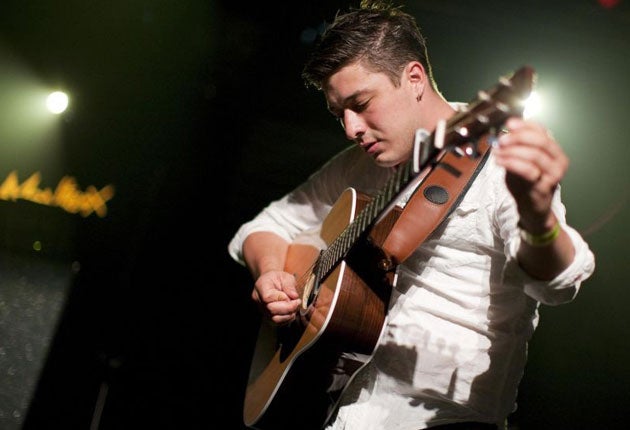Small is still beautiful for the folk-rockers
There could be a downside to Mumford & Sons and other folk bands playing stadium-sized arenas, warns Elisa Bray

Your support helps us to tell the story
From reproductive rights to climate change to Big Tech, The Independent is on the ground when the story is developing. Whether it's investigating the financials of Elon Musk's pro-Trump PAC or producing our latest documentary, 'The A Word', which shines a light on the American women fighting for reproductive rights, we know how important it is to parse out the facts from the messaging.
At such a critical moment in US history, we need reporters on the ground. Your donation allows us to keep sending journalists to speak to both sides of the story.
The Independent is trusted by Americans across the entire political spectrum. And unlike many other quality news outlets, we choose not to lock Americans out of our reporting and analysis with paywalls. We believe quality journalism should be available to everyone, paid for by those who can afford it.
Your support makes all the difference.The rock trio Muse have become accustomed to playing stadiums – a few weeks ago they were at Wembley – but their frontman Matt Bellamy said recently that he would like to return to smaller venues. Muse would have no problem in downsizing their shows. But what about the other way around – those bands whose popularity outsize the sound of their music?
Muse and Kings of Leon are among the few whose sound fills huge, cavernous stadiums and arenas, and the crowds that they house. Sometimes, the larger the venue means less of the atmosphere and intimacy that smaller venues offer.
That would definitely be the case for folk-rock, whose rapid rise in popularity has seen Mumford & Sons make the Top 10 chart and sell out 5,000-capacity venues such as Hammersmith Apollo, despite having released just one album. It will be interesting to see how well they project. They have the big-hearted melodies, infectious energy, and the fan base to sell out the venues (tickets for Hammersmith are currently selling for £75 on eBay, twice their face value), but how would they fill a hall any larger with one bass drum and fiddles?
Meanwhile, the Americana folk-rock band Fleet Foxes, who sold more than 400,000 copies of their debut album in the UK alone, and have a second due in 2011, could sell out arenas, but the largest venue they are playing on their upcoming tour will be the Hammersmith Apollo as that venue is as big as the band want to go. But since this tour marks only their second album, relatively early in their career, where do they go from here? The size of the venues played by acts is determined by demand, but in the case of folk-rock acts, their success is limited by their own sound.
A new folk act would struggle to command an arena-sized audience. Steve Homer, vice president of Live Nation, says: "Fleet Foxes are stuck with the whole thing of the sound of the band. Artists of the nu-folk genre like Mumford & Sons don't have a stage show; their music isn't revolved around big screens, and lots of pyrotechnics. There is a danger of bands playing venues that are too big. The demand for Mumford & Sons is enormous, but it would be a mistake for them to play Wembley Arena even though they could probably sell the tickets. It's a dilemma – they did fantastically well at Reading and Leeds festivals, but people would be less keen to go to see them at Wembley – it's not quite as much fun."
Before Elbow won the Mercury in 2008, Guy Garvey told me his great ambition was to perform at an arena – a feat he since achieved, and fully realises when the band go on an arena tour in March. While their show has grown with each album that they have released, and their song "One Day Like This" is arena-friendly, they still remain a band whose intricate keyboard arrangements, personal lyrics, warmth and lack of rock star posing best suit the intimacy of a smaller venue. Even established acts like Ray LaMontagne play smaller venues because it befits their style of music.
Huge shows by Muse, U2 and Radiohead, meanwhile, are carefully designed as audio-visual experiences. "It's easier with rock music," says Homer. "It's always a big step for a band when they first play an arena. Bands really have to think about the fans at the back of the hall; they could be watching paint dry."
The problem for folk-rock acts is that they reach their ceiling much earlier, and end up doing multiple nights in order to play the shows that they and their fans want. Mumford & Sons could play five nights at the Shepherd's Bush Empire to avoid playing to 10,000 in one night, costing much more in hotel and travel bills, as guitar duo Rodrigo y Gabriela are doing in November. At the height of their success 10 years ago, alternative indie bands Beastie Boys and Beck shied away from arenas as they felt the show wouldn't work in bigger rooms. But if Mumford & Sons keep on rising, they might just have to face the arena.
Join our commenting forum
Join thought-provoking conversations, follow other Independent readers and see their replies
Comments